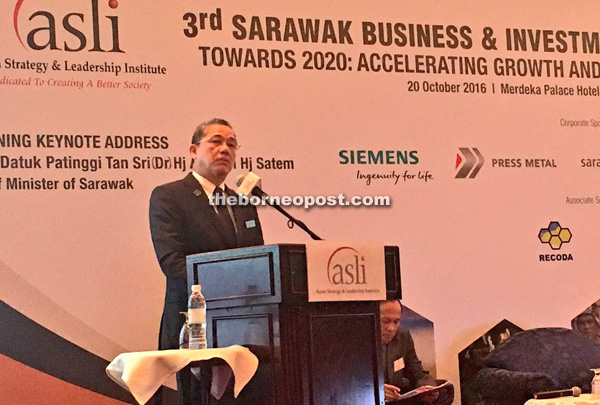
In his keynote address during Asian Strategy Leadership Institute’s (ASLI) third Sarawak Business and Investment Summit, Fadillah highlighted that to steer Sarawak in the right direction, the state government has formulated the Sarawak Socio-Economic Transformation Plan (SETP) covering a period of 15 years, starting this year until 2030.
KUCHING: Sarawak’s infrastructure and connectivity developments remain high on the national agenda with many initiatives implemented to accelerate Sarawak’s growth while more are in the planning, says Minister of Malaysia Datuk Seri Fadillah Yusof.
In his keynote address during Asian Strategy Leadership Institute’s (ASLI) third Sarawak Business and Investment Summit, Fadillah highlighted that to steer Sarawak in the right direction, the state government has formulated the Sarawak Socio-Economic Transformation Plan (SETP) covering a period of 15 years, starting this year until 2030.
“The SETP will be executed in phases starting with the 11th Malaysian Plan to ensure Sarawak achieves a high income and developed status by 2030, covering all sectors of the economy including the development and introduction of roads, airports, ports, water, electricity, telecommunications, information and technology (ICT), healthcare, and education infrastructures which are essential to attract private investments and facilitate business activities in the state,” he said.
Some of the major initiatives set by the government to boost the infrastructure growth in Sarawak includes the acceleration of the Pan Borneo Highway.
The federal government has also approved four new projects in Sarawak – namely the Igan Bridge, Rambungan Bridge, Medan Jaya Flyover, and Batang Lupar Bridge – with a total cost of RM1.55 billion. These four projects are expected to commence by the end of 2017.
Aside from that, to encourage investments into the state and to boost the state’s tourism industry, Malaysia’s government has initiated the upgrading of Short Take-off Landing (STOL) airstrips projects which include the approval of funding for the construction of the new Mukah Airport and the upgrading of Miri’s Airport.
“An example of the state’s commitment to develop airports in rural areas is the announcement of funding for the full-fledged RM341 million Mukah Airport in February 2016 to replace Mukah’s existing STOL to cater for larger aircrafts.
“The earth work of this airport is almost completed at 93 per cent and the second phase is expected to start in 2017 where the federal government has also made the upgrading of the Miri airport a top priority by allocating RM285 million for two taxiways and expanding its car park which are already in their final stages of construction,” Fadillah revealed.
On the Sarawak Corridor of Renewable Energy (SCORE) project, Fadillah noted that SCORE would eventually connect 12 hydroelectric dams to various industrial hubs from Tanjung Manis to Samalaju and this is expected to create employment and generate income for the state in the long run while it also creates opportunities for investors to invest in sustainable growth.
To date, more than RM30 billion worth of investments by 15 major companies including multinational companies have invested in SCORE.
Meanwhile, ASLI’s co-founder and chief executive officer Tan Sri Dr Michael Yeoh, hoped that the business community in Sarawak as well as investors from outside Sarawak could work together with the state government to bring greater value, prosperity and development to the state.
“Sarawak going forward, should focus on the four ‘E’ and four ‘I’ in the next phase development. With this 4Es and 4Is, it is hoped that this would indicate the future direction of the state.
“The four Es are enhancing economic competitiveness, education, energy and environment while the four Is include infrastructure development, innovation investment, and inclusive development.
“I believe that these four Es and Is are already a core focus point in the state’s agenda but I hope that these initiatives will be accelerated,” Yeoh said in his speech.
ASLI’s third Sarawak Business and Investment Summit is themed as ‘Towards 2020: Accelerating Growth and Development’ and was officiated by Chief Minister Tan Sri Adenan Satem.
It also saw an attendance and sponsorship of major corporates such as Siemens Malaysia, Press Metal Bhd, Sarawak Energy Bhd, and Ta Ann Holdings Bhd as well as Regional Corridor Development Authority (Recoda) and Bintulu Port.
